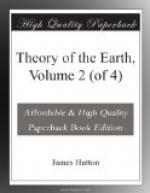Surely, if there is in the system of nature wisdom, we may look for compensation between the destroying and repairing operations of the globe. But why seek for this compensation in the rest or immobility of things? Why suppose perfection in the want of change? The summit of the Alps was once the bottom of the sea; the existence of our land depended then upon the change of seas and continents. But has the earth already undergone so great changes, and is it not yet arrived at the period of its perfection? How can a philosopher, who is so much employed in contemplating the beauty of nature, the wisdom and goodness of Providence, allow himself to entertain such mean ideas of the system as to suppose, that, in the indefinite succession of time past, there has not been perfection in the works of nature? Every material being exists in motion, every immaterial being in action and in passion; rest exists not any where; nor is it found in any other way, except among the parts of space. Surely it is contrary to every species of philosophy, whether ancient or modern, to found a system on the inutility of repose, or place perfection in the vacuity of rest, when every thing that truly exists, exists in motion; when every real information which we have is derived from a change; and when every excess in nature is compensated, not by rest, but by alternation.
M. de Luc allows the rivers to carry matter always to the sea; but then, at a certain period, this matter carried by the floods is to be compensated to the mountains by the vegetable earth received from the air and rains. Here is a proposition which should be well considered, before it be admitted as a principle, which shall establish the perpetuity of these mountains, if it be true; or, if false, assure us of their future demolition. Let us now examine it.
If from air and rain there is produced earth which cannot afterwards be resolved by the operation of those elements, and thus again dissolved in the air and water of the land, then this author might have had some pretext, however insufficient, for alledging that it might be possible to compensate the loss of mineral substances, carried off the surface of the earth, by the production of this vegetable matter from the air and rain; but, when there is not sufficient reason to conclude that any substance, produced in vegetation, can resist the continued influences of the air and water, without being decomposed in its principles, and at last entirely dissolved in water, the cautious argument here employed by this author, for the permanency of mountains, must appear as groundless in its principle as it would be insufficient for his purpose, were it to be admitted; but this will require some discussion.




